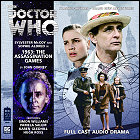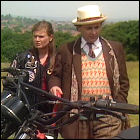 It is late 1963, and one of the leading figures in a project to reposition Britain as a major player in the nuclear arms race is assassinated before the eyes of dozens of witnesses at a press conference. Among those witnesses is Group Captain Gilmore, who draws his weapon and pursues the assassin into an underground station. The assassin draws a bead on Gilmore, but his aim is thrown off at the last second by a man Gilmore has met before – the Doctor. But even this is not a guarantee of bringing the assassin to justice: he jumps in front of the next underground train after dropping a hint that he may be a member of a radical group of nuclear disarmament activists. The Doctor has assumed the identity of a public servant and a position within the British government, keeping a low profile while trying to observe the activities of a mysterious group operating within the government itself. Ace, in the meantime, is also undercover, and encounters Dr. Rachel Jensen, Gilmore’s scientific advisor, and the two are soon embroiled in a plot being carried out by a shadowy agency that has radically unpeaceful intentions. The race is on to start or prevent a war, and this time, the Doctor doesn’t have all the facts.
It is late 1963, and one of the leading figures in a project to reposition Britain as a major player in the nuclear arms race is assassinated before the eyes of dozens of witnesses at a press conference. Among those witnesses is Group Captain Gilmore, who draws his weapon and pursues the assassin into an underground station. The assassin draws a bead on Gilmore, but his aim is thrown off at the last second by a man Gilmore has met before – the Doctor. But even this is not a guarantee of bringing the assassin to justice: he jumps in front of the next underground train after dropping a hint that he may be a member of a radical group of nuclear disarmament activists. The Doctor has assumed the identity of a public servant and a position within the British government, keeping a low profile while trying to observe the activities of a mysterious group operating within the government itself. Ace, in the meantime, is also undercover, and encounters Dr. Rachel Jensen, Gilmore’s scientific advisor, and the two are soon embroiled in a plot being carried out by a shadowy agency that has radically unpeaceful intentions. The race is on to start or prevent a war, and this time, the Doctor doesn’t have all the facts.
written by John Dorney
directed by Ken Bentley
music by Wilfredo AcostaCast: Sylvester McCoy (The Doctor), Sophie Aldred (Ace), Simon Williams (Group Captain Gilmore), Pamela Salem (Rachel Jensen), Karen Gledhill (Allison Williams), Hugh Ross (Sir Toby Kinsella), Oliver Cotton (Sir Gideon Vale / Handler), Gemma Saunders (Eleanor Vale / Amanda Caulfield), Gerald Kyd (Martin Regan / Sir Robert Devere / Mulryne), Alisdair Simpson (Sir Francis White / Ritchie)
Notes: This story is meant to serve retroactively as a “pilot” for the Big Finish audio spinoff Counter-Measures, involving Gilmore, Dr. Jensen and Allison Williams, a group of characters introduced in the 1988 television story Remembrance Of The Daleks. By the time The Assassination Games saw release, there had already been two box sets of Counter-Measures adventures released by Big Finish. This also concludes the loosely-linked trilogy of 1963-themed stories released to coincide with the 50th anniversary of Doctor Who in 2013.
Timeline: after Remembrance Of The Daleks and before The Harvest
LogBook entry and TheatEar review by Earl Green
Review: A twisting, turning, unpredictable tale of political intrigue and international (to say nothing of interplanetary) espionage, The Assassination Games relieved me by not – contrary to what is implied by its cover artwork – dwelling entirely on the Kennedy assassination. For one thing, it’s already been done (the seventh Doctor already links the killing of President Kennedy with the malign influence of the Nemesis statue in 1988’s Silver Nemesis, and the 1993 book “Who Killed Kennedy?” involves many of the Doctor’s incarnations and companions in that historical event). And for another, other science fiction shows, offering their own spin on that grim historical event, have stepped right up to the line of being offensively exploitative (Quantum Leap’s Lee Harvey Oswald episode, or the Tikka To Ride installment of Red Dwarf). 2013 also marked the 50th anniversary of the assassination of President John F. Kennedy, a day before the 50th anniversary of Doctor Who. Anyone demanding due reverence for the anniversary of the fictional had better be prepared to treat the anniversary of the factual with solemn respect. It’s an event that, increasingly, I think should be “off limits” to time travel stories, whatever their source.
 But since The Assassination Games doesn’t revolve around that event, I found it all the more enjoyable, but even so, I was surprised by the degree of gunplay and explosions involved. This is one of those Big Finish stories where you’d better be giving the story your undivided attention – it’s too easy to get lost trying to give The Assassination Games a casual listen, because there’s a lot going on. Do keep up.
But since The Assassination Games doesn’t revolve around that event, I found it all the more enjoyable, but even so, I was surprised by the degree of gunplay and explosions involved. This is one of those Big Finish stories where you’d better be giving the story your undivided attention – it’s too easy to get lost trying to give The Assassination Games a casual listen, because there’s a lot going on. Do keep up.
The inclusion of the trio of guest characters from Remembrance Of The Daleks makes sense here, but just to thwart expectations, we don’t see them together until they’re reunited in the fourth episode. The same goes for the Doctor and Ace. Amusingly, Ace confuses one of her allies by mentioning James Bond movies as if they’ve been a going concern for over two decades (in 1963, the franchise had only just started). And this is Ace from the 1988 season, something we haven’t gotten from Big Finish before – it’s much more common for the audio adventures to give us an older, angstier Ace.
A bit less fascinating is the notion that there really is an Illuminati-esque group conspiring to run the whole show from behind the scenes, on an interplanetary scale. Aliens or no, it was a bit disappointing. The era of the Cold War isn’t short on real plots and real incidents that could’ve set the end of the world in motion; The Assassination Games even admits that, referencing the Cuban Missile Crisis more than once. In some ways, this story conjures up the same feelings as the television episode Cold War – there’s plenty of story to be told in the story’s setting, and it all involves deeply flawed human beings, not manipulative aliens.
As the closing chapter to Big Finish’s very vaguely connected 1963 cycle, The Assassination Games is adequate, though it’s the weakest of the three. As a two-CD advertisement/prelude to the Counter-Measures spinoff series, it is perhaps more successful.
